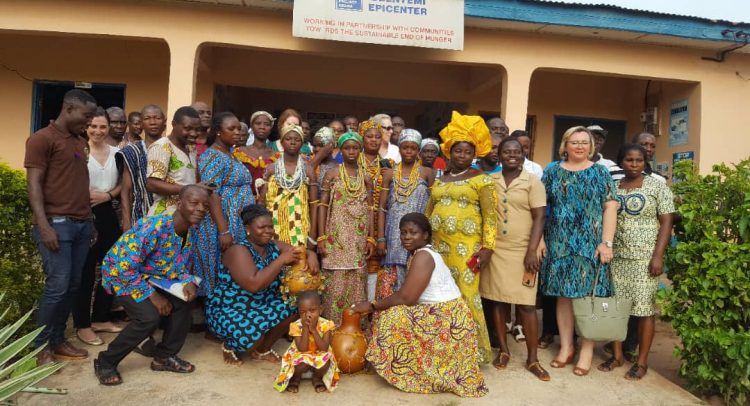A picture taken recently during a donor visit to Obenyemi Epicentre
The Hunger Project (THP) Ghana, with funding from the Else Korner Fresenius Stiftung, (EKFS) a German-based foundation, has helped improve maternal and child health in 150 communities, following the implementation of various activities.
The maternal and child health improvement project, being implemented in 15 epicentres, have benefited 150 communities in three regions. The project has also trained 14 community health nurses (CHN) as midwifery assistants, 15 CHN in family planning services, 15 standard delivery equipment have also been provided for the community clinics, and the protocol for maternal & child health (MCH) has been distributed to the clinics.
The project also trained 73 health volunteers and CHN in MCH education and nutrition, as well as carried out sensitisations for over 11, 650 people in the beneficiary regions like Eastern, Volta, Central and Regions.
Maternal & Child Health Project Coordinator at THP, Stephanie Ashley, who commented on the project, said it was initiated to basically help in the reduction of maternal and child mortalities in the 15 epicentre communities the project operates from.
This, she added, was done through “re-orienting services and creating supportive environment to improve quality healthcare services.”
“We can say that the indicators for maternal and child health have greatly improved in the areas we are working. And the health and well-being of the community members have improved,” she said.
Samuel Erasmus Afrane, THP-Ghana Country Director, who shed more light on the broader work of the organisation, explained that THP offers support to households and provides them with livelihood activities so they can be financially independent and sufficient.
He said most of the communities the organisation works with are engaged in peasant farming and so the alternative source of livelihood the project provides helps them diversify their income.
Mr. Afrane further explained that the women in the communities are also sensitised on their rights through the empowerment seminars frequently organised for the women.
“Our epicentres which serve surrounding communities undertake women empowerment project to specifically train the women in human rights, child rights and marriage rights so when they become knowledgeable of the legal provisions then they will be able to demand their rights,” he said.
Mr. Afrane further indicated that the project works closely with government agencies like the Ministry of Gender, Children and Social Protection, Department of Social Welfare and the Commission for Human Rights and Administration Justice (CHRAJ).
He said THP has a total of 45 epicentres, out of which 15 are benefitting from the maternal and child health improvement project.
The multi-purpose centres, he said, consist of a micro-finance, clinic and other facilities for training and capacity building.
“Throughout the 45 epicentres we reach out to approximately 450,000 people who fall under the surrounding community numbering about 500 rural areas,” he added.
Leni Nebal, Hunger Project German Country Director, expressed her satisfaction at the impact of activities during a project visit to the country with donors.
“I have seen how important empowerment is for people to overcome hunger and poverty… only when I saw the sites that I realised how much people can make out off resilient and power and… that is what I have all over the world,” she said.
By Jamila Akweley Okertchiri

